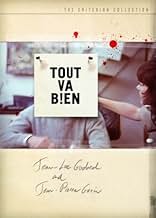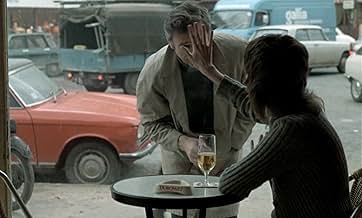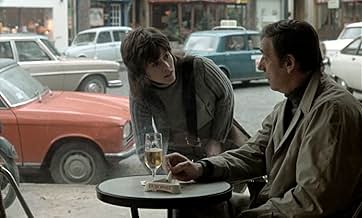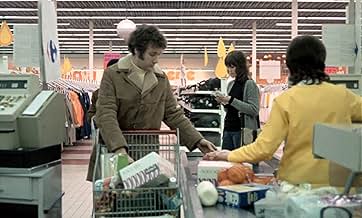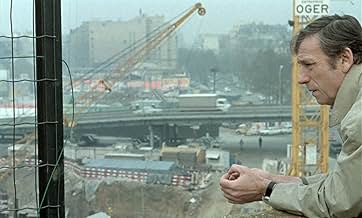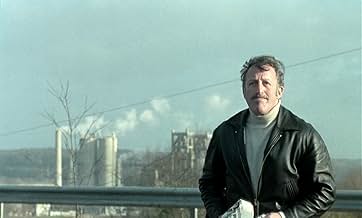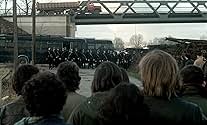IMDb RATING
6.5/10
4.1K
YOUR RATING
Godard examines the structure of movies, relationships and revolutions through the life of a couple in Paris.Godard examines the structure of movies, relationships and revolutions through the life of a couple in Paris.Godard examines the structure of movies, relationships and revolutions through the life of a couple in Paris.
- Directors
- Writers
- Stars
- Awards
- 1 win total
Louis Bugette
- Georges
- (as Bugette)
Yves Gabrielli
- Léon
- (as Yves Gabrieli)
- Directors
- Writers
- All cast & crew
- Production, box office & more at IMDbPro
Featured reviews
From the first credit sequence, Godard captures a realistic storyline in a formalistic fashion. Although these two schools are commonly combined, in Tout va bien they frequently contrast. From the credits at the start the viewer is introduced to the process of making a film, the sound of the clapperboard is followed by an unidentified hand signing off the costs of the film, normally invisible to an audience. The formalism is not particularly abstract but more utilitarian, whether the personal views of the workers are being recorded or two storeys of the factory are shown simultaneously, the viewer is constantly reminded of the artificiality of what is being put in front of the camera in these scenes. In addition to the formalistic shooting, there are strong elements within the storyline that detract from the seriousness of the situation. The comedy with the factory owner's desperate search for a toilet and the prescribed pattern of two lovers falling out and getting back together damage the credibility of the documentary-style scenes. With these constant reminders, it is hard to treat any of the action as real or serious; the revolution in the supermarket seems childish and futile, especially as it takes such a long time for the dreary process of shopping to be converted into a vibrant revolution; the chanting by the strikers also seems unnaturally orchestrated and weak. Symbolism is understated but the blue in the sausage factory seems important as every surface is being painted. In film this colour is associated with subdued emotions, it isn't a fiery colour of revolution but a cool, stable colour, even at its most vivid. Other recurring symbols might include the police, who are labeled as fascists and so on, dressed in black overcoats, dehumanised, until one policeman is turned from pursuer into pursued, again perhaps a comic moment and one that could be stretched to symbolise the brief glory of Mai '68. In general though, the large numbers of police imply a zero-tolerance approach to dissenters that coincides with the small numbers who turn out to demonstrate showing the trend to abandon the picket line in favour of earning a living.
Godard has his main character speak directly to the camera of the feeling of dejection and missed opportunities that followed Mai '68. The candid expressions and the direct address give a warm, honest feel to the character that encourages sympathy; we are expected to agree with what he says. Following Mai '68 a cross-section of society seemed to support widespread social change, workers felt that their voice would be heard and an enormous feeling of euphoric empowerment was experienced. Following those events, the C.G.T leadership as well as the communist party seemed to abandon the cause of the ouvriers taking up contradictory positions of passive acceptance. The issues that remained a problem went unresolved whilst the energy was gradually sapped out of those willing to protest until they became marginalised and unpopular. This is expressed by the loneliness of the strikers, the pettiness of the student rioters, and the way that when the rioters clash with the police they are inevitably outnumbered: society no longer has any time for them; they have become nothing more than a nuisance. This leads to the political leaning of the film. Aside from the fascist police, the right, exemplified by the factory owner are broadly ridiculed. Even the radio station where Jane Fonda works is clearly put in the wrong by the film. Sympathy is felt for the workers but they don't seem to have any particular ethos, certainly gauchistes aren't glorified in any sense. The only support politically seems to be given to the spontaneous and apparently anarchic students but there is no sense of moral resolution in their favour, on the contrary the ultimately inconsequential nature of their protest encourages the same cynicism that was reserved for the other political stances represented in the film. All this is contributes to the overall impression given off by the film, that of ennui. Many of the other comments posted have picked up on the boredom inspired by the film but I would differentiate between the two. Ennui being a French word, and one that has been explored by the greatest authors in French literature, it is not surprising that one of the greatest multimedia essayists in the world, who also happens to be French, should explore ennui in another medium. The difference between French ennui and English boredom is that ennui carries with it an enormous sense of frustration. The two C.G.T cronies are expressive of boredom as they wait for their spokesman to finish his lengthy speech; the censorship of Jane Fonda's character, the isolation of the factory strikers, the sleaziness of Yves Montand's rotting career, in fact the feeling of disinterest inspired by most of the scenes, these encompass ennui. If it can be assumed that Godard took the usual degree of care in making this film, then it must be the case that the drawn out shots in the factory and the supermarket that seemed to express ennui most clearly are deliberate. Whether this is sufficient defence for a film that flopped at the box-office is debateable. Nevertheless if Godard's intention was to portray a situation devoid of inspiration and where hope cannot extend beyond a fragile personal relationship, then his film has succeeded.
Godard has his main character speak directly to the camera of the feeling of dejection and missed opportunities that followed Mai '68. The candid expressions and the direct address give a warm, honest feel to the character that encourages sympathy; we are expected to agree with what he says. Following Mai '68 a cross-section of society seemed to support widespread social change, workers felt that their voice would be heard and an enormous feeling of euphoric empowerment was experienced. Following those events, the C.G.T leadership as well as the communist party seemed to abandon the cause of the ouvriers taking up contradictory positions of passive acceptance. The issues that remained a problem went unresolved whilst the energy was gradually sapped out of those willing to protest until they became marginalised and unpopular. This is expressed by the loneliness of the strikers, the pettiness of the student rioters, and the way that when the rioters clash with the police they are inevitably outnumbered: society no longer has any time for them; they have become nothing more than a nuisance. This leads to the political leaning of the film. Aside from the fascist police, the right, exemplified by the factory owner are broadly ridiculed. Even the radio station where Jane Fonda works is clearly put in the wrong by the film. Sympathy is felt for the workers but they don't seem to have any particular ethos, certainly gauchistes aren't glorified in any sense. The only support politically seems to be given to the spontaneous and apparently anarchic students but there is no sense of moral resolution in their favour, on the contrary the ultimately inconsequential nature of their protest encourages the same cynicism that was reserved for the other political stances represented in the film. All this is contributes to the overall impression given off by the film, that of ennui. Many of the other comments posted have picked up on the boredom inspired by the film but I would differentiate between the two. Ennui being a French word, and one that has been explored by the greatest authors in French literature, it is not surprising that one of the greatest multimedia essayists in the world, who also happens to be French, should explore ennui in another medium. The difference between French ennui and English boredom is that ennui carries with it an enormous sense of frustration. The two C.G.T cronies are expressive of boredom as they wait for their spokesman to finish his lengthy speech; the censorship of Jane Fonda's character, the isolation of the factory strikers, the sleaziness of Yves Montand's rotting career, in fact the feeling of disinterest inspired by most of the scenes, these encompass ennui. If it can be assumed that Godard took the usual degree of care in making this film, then it must be the case that the drawn out shots in the factory and the supermarket that seemed to express ennui most clearly are deliberate. Whether this is sufficient defence for a film that flopped at the box-office is debateable. Nevertheless if Godard's intention was to portray a situation devoid of inspiration and where hope cannot extend beyond a fragile personal relationship, then his film has succeeded.
After his four-year, self-imposed Maoist/nihilist "exile," Godard made a temporary -- albeit slight -- overture toward conventional commercial (or "bourgeois," as Godard called it) cinema by combining a leftist political essay with a dissection of human interaction. Alas, the film fails on both these levels; as a study of the male-female relationship, it is nowhere near "Contempt" and "Masculin-Feminin"; as a pure Maoist political tract, it is shallow and mind-numingly boring compared to "Le Gai Savior" and "Vladimir and Rosa." Nevertheless, "Tout va bien" is nonetheless important within Godard's extraordinary body of work, for it marked the beginning of the seven-year process in which his films would gradually shed their ultra-leftist leanings and move towards more universal, humanistic themes, a process that would ultimately cumulate in the excellent "Every Man For Himself." Even true Godard aficionados will be as bored as everyone else, but they should nonetheless go out of their way to secure a copy.
Jean-Luc Godard's follow-up to the ultra-Maoist Weekend, featuring Yves Montand as a former New Wave filmmaker and his wife Jane Fonda, as they become active in a factory takeover. The film is of course very sympathetic to Marxism and perhaps Leninism, but it's certainly toned down from the blood fest that is Weekend, perhaps regrettably. Godard insists on reinterpreting and imposing entirely new ideas about what a film can and ought to be, in this case an intellectualized espousal of the working class struggle. A few moments of daring misce-en-scene are worth mentioning; fist, Godard includes an awesome cutaway of the factory to reveal the power-dynamics of the uprising within, and an elaborate tracking sequence in a supermarket to reveal the gross stupidity of capitalist consumerism. Tout Va Bien is clearly a step-down from Godard's brilliant features of the 60's, but it's still provocative and worth any cinephile's time.
In the wake of May 1968 which effectually bookends the unrivaled movement of Nouvelle Vague, Godard founded Groupe Dziga Vertov (1968-1972), among which Maoist Jean-Pierre Gorin is a key figure, and TOUT VA BIEN is the most well-known works of the group's output, also heralds Godard's seminal transition from narrative tradition to a more essayistic, esoteric platform to which he has cleft ever since.
International star power swells in TOUT VA BIEN, Jane Fonda, freshly copping her first Oscar for KLUTE (1971), but subsequently...
keep reading my review on my blog: cinema omnivore, thanks!
International star power swells in TOUT VA BIEN, Jane Fonda, freshly copping her first Oscar for KLUTE (1971), but subsequently...
keep reading my review on my blog: cinema omnivore, thanks!
Godard work sometimes is not entirely understood. having seen most of his films i must say the this film is one of the more comprehensible of the lot. To my understanding it deals with an important issue of the postmodern graded. the issue of how to react to the capitalist society in which we live in. Being disappointed from the communist party, as well as the worker's unions which turned their backs to the working class, the people are left with no alternative but to commence a revolution, one that uses force, one that shakes the basis of society. He also shows how the burglar reporters and film creator as a representing free mind are also been exploited by the capitalist regime and their creative spirits is dying. for the the solution is to continue creating at all cost. to bring the cry of the people, to help the coming revolution. The last scene at the supermarket is quite fantastic, and it shows the decay of the great ideas (a communist part member sells his book at a discount price but doesn't know what's written there, and the youth that stand up to the society rules and help people to leave the supermarket and not pay). I strongly recommend this movie, although you need some patience with Godard's worth the time.
Did you know
- TriviaMost of the shots contain all the three colours of the French flag: blue, white and red.
- Quotes
Narrator: There'd be farmers who farm. Workers who work. And bourgeois who bourgeois.
- ConnectionsEdited into Bande-annonce de 'Tout va bien' (1972)
- SoundtracksIl y a du Soleil sur la France
Music by Eric Charden
Lyrics by Frank Thomas and Jean-Michel Rivat
Performed by Stone et Charden
- How long is All's Well?Powered by Alexa
Details
- Runtime1 hour 35 minutes
- Sound mix
- Aspect ratio
- 1.66 : 1
Contribute to this page
Suggest an edit or add missing content


